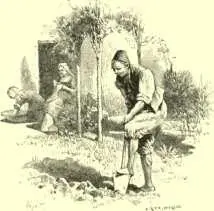This discourse gave birth to new reflections, and Martin especially concluded that man was born to live in the convulsions of disquiet, or in the lethargy of idleness. Though Candide did not absolutely agree to this, yet he did not determine anything on that head. Pangloss avowed that he had undergone dreadful sufferings; but having once maintained that everything went on as well as possible, he still maintained it, and at the same time believed nothing of it.
There was one thing which more than ever confirmed Martin in his detestable principles, made Candide hesitate, and embarrassed Pangloss, which was the arrival of Pacquette and Brother Giroflée one day at their farm. This couple had been in the utmost distress; they had very speedily made away with their three thousand piastres; they had parted, been reconciled; quarrelled again, been thrown into prison; had made their escape, and at last Brother Giroflée had turned Turk. Pacquette still continued to follow her trade; but she got little or nothing by it. “I foresaw very well,” said Martin to Candide, “that your presents would soon be squandered, and only make them more miserable. You and Cacambo have spent millions of piastres, and yet you are not more happy than Brother Giroflée and Pacquette.” “Ah!” said Pangloss to Pacquette, “it is heaven that has brought you here among us, my poor child! Do you know that you have cost me the tip of my nose, one eye, and one ear? What a handsome shape is here! and what is this world!” This new adventure engaged them more deeply than ever in philosophical disputations.
In the neighborhood lived a famous dervish who passed for the best philosopher in Turkey; they went to consult him: Pangloss, who was their spokesman, addressed him thus: “Master, we come to entreat you to tell us why so strange an animal as man has been formed?”
“Why do you trouble your head about it?” said the dervish; “is it any business of yours?” “But, my reverend father,” said Candide, “there is a horrible deal of evil on the earth.” “What signifies it,” said the dervish, “whether there is evil or good? When his highness sends a ship to Egypt does he trouble his head whether the rats in the vessel are at their ease or not?” “What must then be done?” said Pangloss. “Be silent,” answered the dervish. “I flattered myself,” replied Pangloss, “to have reasoned a little with you on the causes and effects, on the best of possible worlds, the origin of evil, the nature of the soul, and a pre-established harmony.” At these words the dervish shut the door in their faces.
During this conversation, news was spread abroad that two viziers of the bench and the mufti had just been strangled at Constantinople, and several of their friends empaled. This catastrophe made a great noise for some hours. Pangloss, Candide, and Martin, as they were returning to the little farm, met with a good-looking old man, who was taking the air at his door, under an alcove formed of the boughs of orange-trees. Pangloss, who was as inquisitive as he was disputative, asked him what was the name of the mufti who was lately strangled. “I cannot tell,” answered the good old man; “I never knew the name of any mufti, or vizier breathing. I am entirely ignorant of the event you speak of; I presume that in general such as are concerned in public affairs sometimes come to a miserable end; and that they deserve it: but I never inquire what is doing at Constantinople; I am contented with sending thither the produce of my garden, which I cultivate with my own hands.” After saying these words, he invited the strangers to come into his house. His two daughters and two sons presented them with divers sorts of sherbet of their own making; besides caymac, heightened with the peels of candied citrons, oranges, lemons, pineapples, pistachio nuts, and Mocha coffee unadulterated with the bad coffee of Batavia or the American islands. After which the two daughters of this good Mussulman perfumed the beards of Candide, Pangloss, and Martin.
“You must certainly have a vast estate,” said Candide to the Turk; who replied, “I have no more than twenty acres of ground, the whole of which I cultivate myself with the help of my children; and our labor keeps off from us three great evils — idleness, vice, and want.”
Candide, as he was returning home, made profound reflections on the Turk’s discourse. “This good old man,” said he to Pangloss and Martin, “appears to me to have chosen for himself a lot much preferable to that of the six kings with whom we had the honor to sup.” “Human grandeur,” said Pangloss, “is very dangerous, if we believe the testimonies of almost all philosophers; for we find Eglon, king of Moab, was assassinated by Aod; Absalom was hanged by the hair of his head, and run through with three darts; King Nadab, son of Jeroboam, was slain by Baaza; King Ela by Zimri; Okosias by Jehu; Athaliah by Jehoiada; the kings Jehooiakim, Jeconiah, and Zedekiah, were led into captivity: I need not tell you what was the fate of Crœsus, Astyages, Darius, Dionysius of Syracuse, Pyrrhus, Perseus, Hannibal, Jugurtha, Ariovistus, Cæsar, Pompey, Nero, Otho, Vitellius, Domitian, Richard II. of England, Edward II., Henry VI., Richard III., Mary Stuart, Charles I., the three Henrys of France, and the emperor Henry IV.” “Neither need you tell me,” said Candide, “that we must take care of our garden.” “You are in the right,” said Pangloss; “for when man was put into the garden of Eden, it was with an intent to dress it: and this proves that man was not born to be idle.” “Work then without disputing,” said Martin; “it is the only way to render life supportable.”
The little society, one and all, entered into this laudable design; and set themselves to exert their different talents. The little piece of ground yielded them a plentiful crop. Cunegund indeed was very ugly, but she became an excellent hand at pastrywork; Pacquette embroidered; the old woman had the care of the linen. There was none, down to Brother Giroflée, but did some service; he was a very good carpenter, and became an honest man. Pangloss used now and then to say to Candide, “There is a concatenation of all events in the best of possible worlds; for, in short, had you not been kicked out of a fine castle for the love of Miss Cunegund; had you not been put into the Inquisition; had you not travelled over America on foot; had you not run the baron through the body; and had you not lost all your sheep, which you brought from the good country of El Dorado, you would not have been here to eat preserved citrons and pistachio nuts.” “Excellently observed,” answered Candide; “but let us take care of our garden.”

Table of Contents
CHAPTER I.
HOW CANDIDE QUITTED HIS COMPANIONS, AND WHAT HAPPENED TO HIM.
Table of Contents
We soon become tired of everything in life; riches fatigue the possessor; ambition, when satisfied, leaves only remorse behind it; the joys of love are but transient joys; and Candide, made to experience all the vicissitudes of fortune, was soon disgusted with cultivating his garden. “Mr. Pangloss,” said he, “if we are in the best of possible worlds, you will own to me, at least, that this is not enjoying that portion of possible happiness; but living obscure in a little corner of the Propontis, having no other resource than that of my own manual labor, which may one day fail me; no other pleasures than what Mrs. Cunegund gives me, who is very ugly; and, which is worse, is my wife; no other company than yours, which is sometimes irksome to me; or that of Martin, which makes me melancholy; or that of Giroflée, who is but very lately become an honest man; or that of Pacquette, the danger of whose correspondence you have so fully experienced; or that of the hag who has but one buttock, and is constantly repeating old wives’ tales.
Читать дальше













